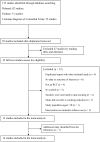Effect of Smoking Reduction Therapy on Smoking Cessation for Smokers without an Intention to Quit: An Updated Systematic Review and Meta-Analysis of Randomized Controlled
- PMID: 26308034
- PMCID: PMC4586609
- DOI: 10.3390/ijerph120910235
Effect of Smoking Reduction Therapy on Smoking Cessation for Smokers without an Intention to Quit: An Updated Systematic Review and Meta-Analysis of Randomized Controlled
Abstract
Objective: Effective strategies are needed to encourage smoking cessation for smokers without an intention to quit. We systematically reviewed the literature to investigate whether smoking reduction therapy can increase the long-term cessation rates of smokers without an intention to quit.
Methods: PubMed, Embase, and CENTRAL (Cochrane Central Register of Controlled Trials) were searched for randomized controlled trials (RCTs) on the effect of smoking reduction therapy on long-term smoking cessation in smokers without an intention to quit. The primary outcome was the cessation rate at the longest follow-up period. A random effects model was used to calculate pooled relative risks (RRs) and 95% confidence intervals (CIs).
Results: Fourteen trials with a total of 7981 smokers were included. The pooled analysis suggested that reduction support plus medication significantly increased the long-term cessation of smokers without an intention to quit compared to reduction support plus placebo (RR, 1.97; 95% CI, 1.44-2.7; I(2), 52%) or no intervention (RR, 1.93; 95% CI, 1.41-2.64; I(2), 46%). In a subgroup of smokers who received varenicline or nicotine replacement therapy (NRT), the differences were also statistically significant. This suggests the safety of using NRT. The percentage of smokers with serious adverse events who discontinued because of these events in the non-NRT group was slightly significantly different than in the control group. Insufficient evidence is available to test the efficacy of reduction behavioural support in promoting long-term cessation among this population.
Conclusions: The present meta-analysis indicated the efficacy of NRT- and varenicline-assisted reduction to achieve complete cessation among smokers without an intention to quit. Further evidence is needed to assess the efficacy and safety of reduction behavioural support and bupropion.
Keywords: meta-analysis; nicotine replacement therapy; smoking reduction therapy; varenicline; without quit intention.
Figures





Similar articles
-
Nicotine receptor partial agonists for smoking cessation.Cochrane Database Syst Rev. 2012 Apr 18;(4):CD006103. doi: 10.1002/14651858.CD006103.pub6. Cochrane Database Syst Rev. 2012. Update in: Cochrane Database Syst Rev. 2016 May 09;(5):CD006103. doi: 10.1002/14651858.CD006103.pub7. PMID: 22513936 Updated.
-
Nicotine receptor partial agonists for smoking cessation.Cochrane Database Syst Rev. 2016 May 9;2016(5):CD006103. doi: 10.1002/14651858.CD006103.pub7. Cochrane Database Syst Rev. 2016. Update in: Cochrane Database Syst Rev. 2023 May 5;5:CD006103. doi: 10.1002/14651858.CD006103.pub8. PMID: 27158893 Free PMC article. Updated.
-
Nicotine receptor partial agonists for smoking cessation.Cochrane Database Syst Rev. 2011 Feb 16;(2):CD006103. doi: 10.1002/14651858.CD006103.pub5. Cochrane Database Syst Rev. 2011. Update in: Cochrane Database Syst Rev. 2012 Apr 18;(4):CD006103. doi: 10.1002/14651858.CD006103.pub6. PMID: 21328282 Updated.
-
Nicotine receptor partial agonists for smoking cessation.Cochrane Database Syst Rev. 2010 Dec 8;(12):CD006103. doi: 10.1002/14651858.CD006103.pub4. Cochrane Database Syst Rev. 2010. Update in: Cochrane Database Syst Rev. 2011 Feb 16;(2):CD006103. doi: 10.1002/14651858.CD006103.pub5. PMID: 21154363 Updated.
-
Pharmacological interventions for smoking cessation: an overview and network meta-analysis.Cochrane Database Syst Rev. 2013 May 31;2013(5):CD009329. doi: 10.1002/14651858.CD009329.pub2. Cochrane Database Syst Rev. 2013. PMID: 23728690 Free PMC article.
Cited by
-
Abrupt versus gradual smoking cessation with pre-cessation nicotine replacement therapy for cigarette smokers motivated to quit.Ann Transl Med. 2016 Oct;4(19):384. doi: 10.21037/atm.2016.08.16. Ann Transl Med. 2016. PMID: 27826586 Free PMC article. No abstract available.
-
Working alliance and empathy as mediators of brief telephone counseling for cigarette smokers who are not ready to quit.Psychol Addict Behav. 2017 Feb;31(1):130-135. doi: 10.1037/adb0000243. Psychol Addict Behav. 2017. PMID: 28165273 Free PMC article. Clinical Trial.
-
Clinical practice guideline: evidence, recommendations and algorithm for the preoperative optimization of anemia, hyperglycemia and smoking.Can J Surg. 2021 Oct;64(5):E491-E509. doi: 10.1503/cjs.011519. Can J Surg. 2021. PMID: 34598927 Free PMC article. Review.
-
Neuromodulation for substance addiction in human subjects: A review.Neurosci Biobehav Rev. 2018 Dec;95:33-43. doi: 10.1016/j.neubiorev.2018.09.013. Epub 2018 Sep 27. Neurosci Biobehav Rev. 2018. PMID: 30268433 Free PMC article. Review.
-
Association of Tobacco Dependence Treatment Coverage Expansion With Smoking Behaviors Among Medicaid Beneficiaries Living With Substance Use Disorder.Am J Prev Med. 2025 Mar;68(3):485-496. doi: 10.1016/j.amepre.2024.11.010. Epub 2024 Nov 28. Am J Prev Med. 2025. PMID: 39615768
References
-
- Boyle P., Gandini S., Robertson C. Characteristics of smokers’ attitudes towards stopping: Survey of 10,295 smokers in representative samples from 17 European countries. Eur. J. Public Health. 2000;10:5–14. doi: 10.1093/eurpub/10.suppl_3.5. - DOI
-
- Abdullah A.S. How far should we promote smoking reduction in order to promote smoking cessation? Asian Pac. J. Cancer Prev. 2005;6:231–234. - PubMed
Publication types
MeSH terms
Substances
LinkOut - more resources
Full Text Sources
Other Literature Sources
Medical

